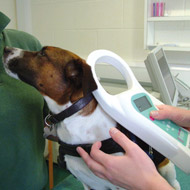Welsh owners required to microchip dogs by April

The Microchipping of Dogs (Wales) Regulations 2015 will come into force on 6 April next year.
From April next year it will be a legal requirement for all dogs in Wales to be microchipped, the Welsh Government has confirmed.
The Microchipping of Dogs (Wales) Regulations 2015 will come into force on 6 April 2016 and will require all dogs over the age of eight weeks to be microchipped, and the keepers' details registered on an approved database.
By law, dogs will still be required to wear a collar and a tag with the owner's name and contact details on it when it is in a public place after compulsory microchipping is introduced.
Following the approval of the regulations on Tuesday (20 October), Farming and Food Minister Rebecca Evans, said: "I would encourage all dog owners who have not already had their dogs’ microchipped to do so as soon as they can.
“Pet owners are far more likely to be reunited with their animals if they are lost, stolen or injured if they have been microchipped.
“The ability to trace all dogs back to their owners should encourage more responsible ownership, breeding and help in the control of dangerous and nuisance dogs by creating a link between a dog and its owner.”
Chief Veterinary Officer for Wales, Professor Christianne Glossop, added: “Microchipping is a simple procedure involving the implantation of a small microchip under the skin of an animal using a needle.
"The unique reference number stored on the microchip must then be registered on a corresponding database with the contact details of the animal’s keeper or owner.”



 The Animal and Plant Health Agency (APHA) has updated its online reporting service for dead wild birds.
The Animal and Plant Health Agency (APHA) has updated its online reporting service for dead wild birds.